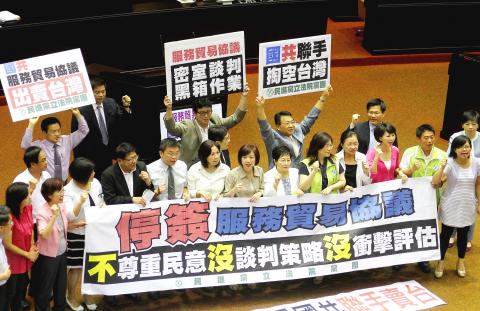Pan-green lawmakers occupied the floor of the legislative chamber yesterday morning with placards reading “the Chinese Nationalist Party [KMT] and the Chinese Communist Party [CCP] are hollowing out Taiwan’s [economy]” to protest the cross-strait service trade agreement that was signed yesterday afternoon.
As a result of the boycott, the plenary session, which had been scheduled to review a number of bills, was forced to adjourn until Tuesday.
“We paralyzed the meeting because the cross-strait service trade agreement was a backroom deal. We must reveal the truth to the public,” Taiwan Solidarity Union legislative caucus whip Hsu Chung-hsin (許忠信) said.

Photo: CNA
Hsu said the party demanded that the agreement be sent to the legislature for approval, not just for the record, and that Premier Jiang Yi-huah (江宜樺) present the agreement to the legislature to discuss its benefits and drawbacks with lawmakers.
“The agreement cannot become effective unless the legislature rectifies it,” Hsu said.
The Mainland Affairs Council had said that it would only submit the agreement on service trade to the legislature for record after the Executive Yuan approves it, citing Article 5 of the Act Governing Relations between the People of the Taiwan Area and the Mainland Area (台灣地區與大陸地區人民關係條例).
Under the article, cross-strait agreements which do not require any amendments to laws or any new legislation must be submitted to the Executive Yuan for approval and then to the legislature for record.
Legislator Lo Shu-lei (羅淑蕾) was one of the KMT lawmakers who vowed to rigorously review the agreement to assess how it would impact the nation’s service sector.
“Which sectors are likely to be harmed? The government should be open to the public about that,” Lo said.
KMT legislative caucus whip Lai Shyh-bao (賴士葆) said the party would not be against reviewing the trade pact in the legislature.
“We understand why the public has expressed concerns over the agreement. Their concerns need to be addressed,” Lai said.
Democratic Progressive Party legislative caucus whip Pan Men-an (潘孟安) said the agreement would affect the nation in a “destructive” way, with 72 percent of the nation’s service industry which employs 7 million workers being affected by the pact.
“It’s not that we oppose trade normalization with China, but Taiwan could lose its competitive edge as a result of the agreement. There is no shortage of funds, technology or workforce in service sectors in Taiwan,” Pan said.
Meanwhile, the People First Party (PFP) issued a press release saying that the legislature was vested with the power to rectify or abrogate the agreement.
The PFP added that it opposed lifting the cap on Chinese investment in sectors that would devastate local businesses and demanded that the government allocate sufficient funds to help businesspeople upgrade or transform their businesses and to assist local businesses in tapping Chinese markets as complementary measures to reduce negative impacts.
In response to media inquiries, Legislative Speaker Wang Jin-pyng (王金平) said he had no idea which sectors the trade pact would cover because the Mainland Affairs Council has never briefed him on the contents either.

Taiwanese actress Barbie Hsu (徐熙媛) has died of pneumonia at the age of 48 while on a trip to Japan, where she contracted influenza during the Lunar New Year holiday, her sister confirmed today through an agent. "Our whole family came to Japan for a trip, and my dearest and most kindhearted sister Barbie Hsu died of influenza-induced pneumonia and unfortunately left us," Hsu's sister and talk show hostess Dee Hsu (徐熙娣) said. "I was grateful to be her sister in this life and that we got to care for and spend time with each other. I will always be grateful to

UNITED: The premier said Trump’s tariff comments provided a great opportunity for the private and public sectors to come together to maintain the nation’s chip advantage The government is considering ways to assist the nation’s semiconductor industry or hosting collaborative projects with the private sector after US President Donald Trump threatened to impose a 100 percent tariff on chips exported to the US, Premier Cho Jung-tai (卓榮泰) said yesterday. Trump on Monday told Republican members of the US Congress about plans to impose sweeping tariffs on semiconductors, steel, aluminum, copper and pharmaceuticals “in the very near future.” “It’s time for the United States to return to the system that made us richer and more powerful than ever before,” Trump said at the Republican Issues Conference in Miami, Florida. “They

TAIWAN DEFENSE: The initiative would involve integrating various systems in a fast-paced manner through the use of common software to obstruct a Chinese invasion The first tranche of the US Navy’s “Replicator” initiative aimed at obstructing a Chinese invasion of Taiwan would be ready by August, a US Naval Institute (USNI) News report on Tuesday said. The initiative is part of a larger defense strategy for Taiwan, and would involve launching thousands of uncrewed submarines, surface vessels and aerial vehicles around Taiwan to buy the nation and its partners time to assemble a response. The plan was first made public by the Washington Post in June last year, when it cited comments by US Indo-Pacific Commander Admiral Samuel Paparo on the sidelines of the Shangri-La Dialogue

REMINDER: Of the 6.78 million doses of flu vaccine Taiwan purchased for this flu season, about 200,000 are still available, an official said, following Big S’ death As news broke of the death of Taiwanese actress and singer Barbie Hsu (徐熙媛), also known as Big S (大S), from severe flu complications, the Centers for Disease Control (CDC) and doctors yesterday urged people at high risk to get vaccinated and be alert to signs of severe illness. Hsu’s family yesterday confirmed that the actress died on a family holiday in Japan due to pneumonia during the Lunar New Year holiday. CDC Deputy Director-General Tseng Shu-hui (曾淑慧) told an impromptu news conference that hospital visits for flu-like illnesses from Jan. 19 to Jan. 25 reached 162,352 — the highest